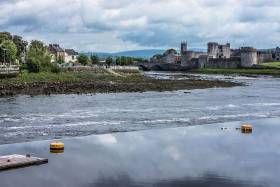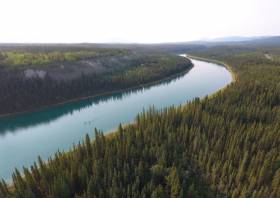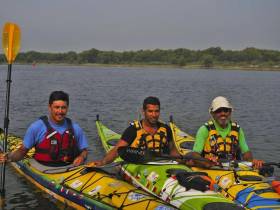Displaying items by tag: Colin Wong
Yukon Challenge Kayakers To Recreate ‘Paddle For Peace’ From Enniskillen To Limerick
An experienced kayaker in training for the world’s longest non-stop paddle race also aims to recreate the ‘paddle for peace’ that celebrated the signing of the Good Friday Agreement.
In 1999, Jim Kennedy and friends showed their support for the historic peace treaty by kayaking from Enniskillen to Limerick along the then reunited Shannon and Erne systems.
“We formed a team of like-minded people from both sides of the border to achieve this,” Kennedy says. “From Enniskillen we had Noel Maguire and from the south we had Pat McCarthy, with Maria Kennedy and Vicky Platt at a bank support team.
“On the way we called on schools and they supported us by doing peace projects in the class room and cheering us on as we passed.”
Kennedy recalls the many villages and towns that hosted the paddling party as they progressed: “We were given a plaque and message of peace by Fermanagh council to deliver to the Limerick County Council. We planted trees of peace in many villages along the way.”
Sections that would have been otherwise impassable were cleared for paddling thanks to the aid of Civil Defence, who opened canal locks, and the ESB, who allowed passage through the Ardnacrusha hydroelectric plant.
Years before the age of social media, the journey, as Kennedy says, “evolved into a great show of support for peace from both ends of the waterways and from all walks of life”.
Twenty years on, there is a generation that has never known the violence of the Troubles first-hand. However, Kennedy says, “we again find ourselves frustrated at all the goings on in the world and are hoping in our small way to draw attention to and celebrate 20 years of peace in Ireland”.
Once more, Kennedy plans to kayak the more than 200 miles from Enniskillen to Limerick, carrying another plaque of peace from council to council.
Noel Maguire and Pat McCarthy have also signed on for the repeat adventure — as has Colin Wong, with whom Kennedy will be taking on the Yukon 1000 challenge in Canada and Alaska next summer, as previously reported on Afloat.ie.
“We hope that many other paddlers from north and south will join in along the way,” Kennedy says. “Should you be interested in joining in or finding out more about this celebration paddle, just let us know or give us a peaceful shout out as we pass by!”
Get in touch with Jim Kennedy via the Facebook page for Atlantic Sea Kayaking.
‘More People Have Summited Everest’: Experienced Irish Duo To Take On World’s Longest Non-Stop Paddle Race
Former kayaking champion Jim Kennedy is embarking on a new adventure — as part of a two-man team taking on the world’s longest non-stop paddle race.
Kennedy has partnered with fellow Irish champion kayaker Colin Wong to represent Ireland in next year’s Yukon 1000 — which as the name suggests is a 1,000-mile river marathon, from Whitehorse in Canada’s Yukon territory to the Yukon River Bridge in central Alaska.
The pair are among only 40 teams chosen out hundreds who apply for the biennial race, which must be completed within 10 days from Sunday 19 July 2020.
But they feel they have the skills and experience between them to reach the finish line within their target of eight days without rest — comprising around one million paddle strokes from end to end through some of the world’s most isolated wilderness.
“More people have summited Everest than have navigated this stretch of river,” Kennedy says.
The 65-year-old and proprietor of Atlantic Sea Kayaking is a long-time instructor and paddling guide, with British and Irish sprint and marathon kayaking titles to his credit — and who has twice competed in and won the 200km non-stop Devizes to Westminster International Canoe Marathon.
Kennedy is also known for paddling the length of Ireland with a cross-border group in support of peace upon the signing of the Good Friday Agreement.
His paddling partner Wong (35) operates his own guided kayaking company in the West of Ireland, and brings a wealth of experience paddling in Africa — from helping to open up rivers in South Africa, Zimbabwe and Kenya, to guiding white water expeditions on the White Nile in Uganda, and being one of the few to run the Zambezi during the rainy season.
Along with long-distance river adventures in the Middle East and central Asia, as well as kayaking marathons and races closer to home such as the Liffey Descent, Wong also has experience of Alaska’s rivers which will no doubt come to bear.
Kennedy says he and Wong have “many reasons for wanting to compete in this incredible race”, not least promoting wellbeing and celebrating “the mental and physical benefits of exercise and nature”.
“Living along the Wild Atlantic Way in Ireland has taught us the importance of responsible adventure and activity,” he adds, emphasising that their adventure aims to highlight growth in adventure tourism in a responsible and sustainable manner.
Cork Man Kayaking Persian Gulf For Ocean Awareness
#Kayaking - A Cork man is in the midst of an epic kayaking expedition along the Persian Gulf to raise awareness of the region’s marine environment, as the Evening Echo reports.
Colin Wong from Bishopstown is close to Abu Dhabi as part of a three-man team that set off from Kuwait over two months ago, and by the time they reach Muscat in Oman they will have covered more than 2,000km along the Gulf’s western coast.
The trio are paddling under the banner of Kayak4Kuwait, with the aim of raising awareness about the importance of the sea to the countries of the Persian Gulf.
While the journey is Wong’s biggest and most demanding expedition, the 32-year-old is no stranger to long stints on the water, kayaking the River Nile in Uganda last November after placing second in the Liffey Descent marathon.
The Evening Echo has more on the story HERE.






























































